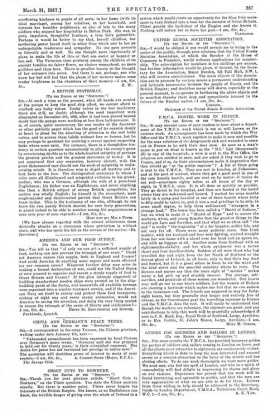Y.M.C.A. HOSTEL WORK IN FRANCE.
[To. THE EDrrOR or TRIG " SPECTATOR:1
SIR,—It may interest some of your readers to hear about a depart ment of the Y.M.C.A. work which is not so well known as the canteen work. An arrangement has been made by which the War Office and the Y.M.C.A. work together to make it easy and possible for the near relatives of the dangerously sick and wounded to come out to France to be with their dear ones. As soon as a man's name is put on what is known as the " D.I." List (dangerously ill) in any of the hospitals, a wire is sent to the War Office, the relatives are notified at once, and are asked if they wish to go to France, and if so, do their circumstances make it imperative that they should go " at the public expense " ? A list of those going is sent to the Y.M.C.A. They are met in London, at Folkestone, and at the port of arrival, where they get a good meal in one of the cosy homely hostels, and are sent on by motor—if trains do not suit—sometimes eighty miles, at all hours of the day or night, in cars. It is all done as quickly as possible. They go direct to the hospital, and then are landed at the hostel where they are welcomed and housed. I worked for some months lately in a camp And boarded at one of these hostels where forty to fifty oould be taken in, and it was a real privilege to be able, in some small degree, to help these sad-hearted " strangers in a strange land." The house has been called a " Hostel of Sadness," but we tried to make it a " Hostel of Hope " and to assure the mothers, wives, and young Halides that the greatest things in the world are Love and Sacrifice, and that what we so often call " the end " is really " the beginning " of a far happier, nobler life, and not very far off. There were many pathetic cases. One Irish mother, with her husband and four sons fighting, arrived straight from her wee home with a shawl over her head and an apron on, and with no luggage at all. Another came from Scotland with an eight-months-old-baby, and her whole equipment was a tartan shawl and four handkerchiefs. Saddest of all were those who had travelled day and night from the far North of Scotland or the distant glens of Ireland, in all haste, only to find their boy dead and buried, but it is a great solace to them to see the ward and the kind sister and the peaceful cemetery where he rests. The doctors and nurses say that the mere sight of " mother " makes many a lad pick up and steadily recover. The courage, self- saerifice, and gratitude of these women are wonderful. Our hearts may well go out to our brave soldiers, but the women of Britain are showing a fortitude which makes one feel that we can endure to the victorious end. The friends are supposed to stay for forty- eight hours, but they generally stay longer and entirely free of charge, as the Government pays the travelling expenses to France and the Y.M.C.A. does the rest. It will easily bo understood that though the workers are voluntary, the expenses are great, and any contributions to help this work will be gratefully acknowledged if sent to J. K. Boyd, Esq., Royal Bank of Scotland, Largs, Ayrshire; or to Mrs. Geddes, St. John's Manse, Largs, Ayrshire.—I am,


























 Previous page
Previous page